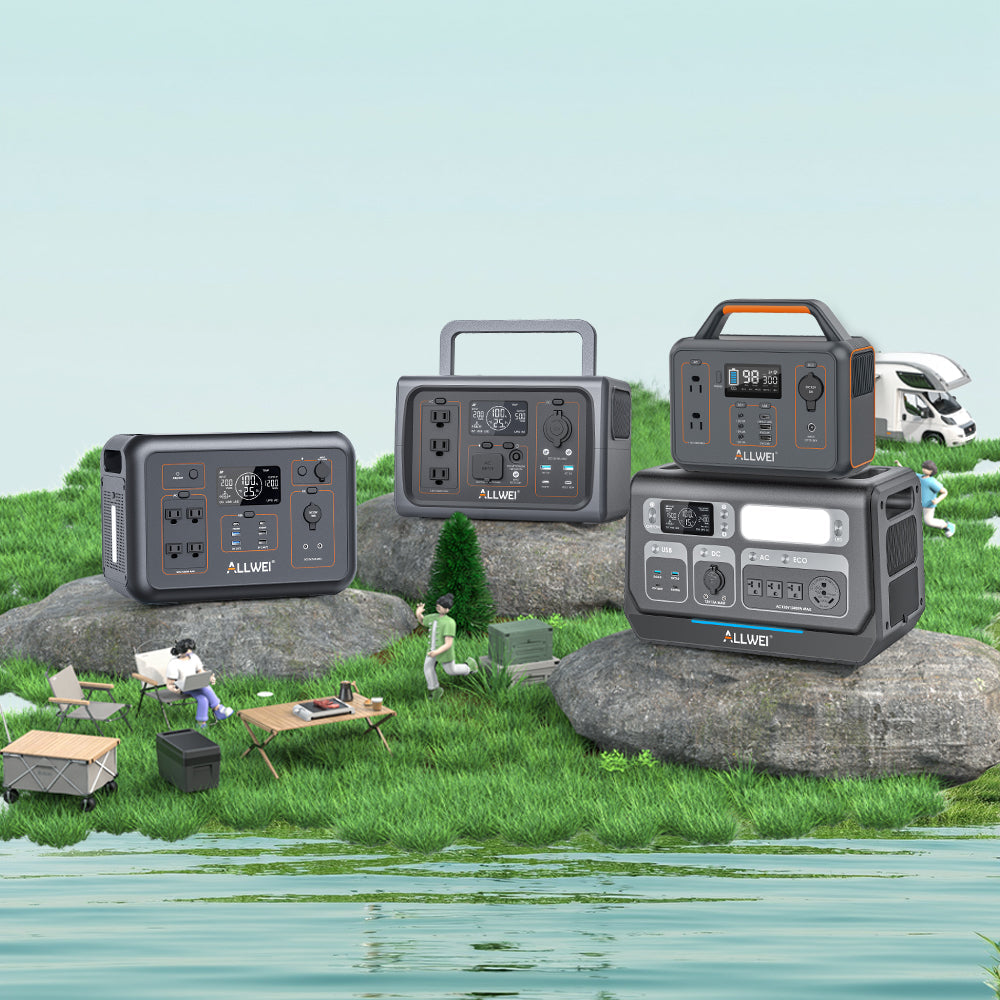As the demand for mobile energy solutions continues to rise, the portable power station has emerged as an essential device for both outdoor enthusiasts and emergency preparedness. These compact power hubs are more than just oversized battery packs—they're engineered systems capable of supplying AC and DC power to a wide range of devices.
A typical portable power station, like the ALLWEI PPS2400, integrates a high-capacity lithium iron phosphate (LiFePO4) battery, a pure sine wave inverter, and multiple output ports including USB-A, USB-C, DC, and AC outlets. What sets LiFePO4 batteries apart is their thermal stability and long cycle life—often exceeding 3,500 charge cycles—making them safer and more durable for long-term use.
These systems are equipped with MPPT solar charging technology, which allows users to recharge using solar panels efficiently. With the correct solar input (like ALLWEI's 200W panel), you can achieve eco-friendly, off-grid energy anywhere under the sun.
Whether you're camping, RV traveling, or experiencing a blackout at home, a power station like the PPS2400 ensures you stay powered. The ability to charge drones, CPAP machines, laptops, and mini-fridges all from one hub makes this a versatile tool.
The Core Components: Understanding the Technology
Lithium Iron Phosphate (LiFePO4) Battery Technology
The heart of any portable power station is its battery system, and LiFePO4 technology represents the current gold standard for portable energy storage. Unlike traditional lithium-ion batteries, LiFePO4 batteries offer superior thermal stability, meaning they're much less likely to overheat or catch fire under stress or high temperatures.
The chemical composition of LiFePO4 batteries provides several key advantages. The iron phosphate cathode material is inherently stable and doesn't undergo the same thermal runaway reactions that can occur with other lithium battery chemistries. This makes them significantly safer for use in portable applications where the battery might be subjected to varying environmental conditions.
The long cycle life of LiFePO4 batteries—often exceeding 3,500 charge cycles—means these power stations can last for years of regular use. Even after thousands of charge and discharge cycles, these batteries typically retain 80% or more of their original capacity, providing excellent long-term value.
Pure Sine Wave Inverter Technology
The inverter is responsible for converting the DC power stored in the battery into AC power that can be used by household appliances and electronic devices. Pure sine wave inverters produce a smooth, consistent electrical waveform that closely matches the quality of grid power.
This high-quality power output is essential for sensitive electronic devices like laptops, medical equipment, and audio systems. Modified sine wave inverters, while cheaper, can cause issues such as audible humming in audio equipment, reduced efficiency in some appliances, and potential damage to sensitive electronics over time.
The ALLWEI PPS2400's pure sine wave inverter can handle loads up to 2400W, making it capable of powering a wide range of appliances from small electronics to larger devices like refrigerators, power tools, and even some air conditioning units.
Advanced Charging Systems and Solar Integration
MPPT Solar Charging Technology
Maximum Power Point Tracking (MPPT) technology represents a significant advancement in solar charging efficiency. Traditional charge controllers operate at a fixed voltage, which means they can't adapt to changing solar conditions. MPPT controllers continuously monitor the solar panel's output and adjust the charging parameters to extract maximum power.
This technology is particularly valuable in real-world conditions where solar intensity varies throughout the day. During morning and evening hours, when sunlight is less intense, MPPT controllers can still extract significant power from solar panels. They also handle partial shading more effectively, ensuring that if one part of a solar panel is shaded, the rest continues to operate at optimal efficiency.
The ALLWEI PPS2400 can accept solar input up to 500W, allowing users to recharge their power station efficiently using solar panels. This capability makes it possible to maintain power independence in remote locations where grid power is unavailable.
Multiple Charging Options
Modern portable power stations offer multiple charging methods to provide maximum flexibility. AC wall charging provides the fastest recharge times, typically completing a full charge in 4-8 hours depending on the model. Car charging allows for recharging while traveling, making it ideal for road trips and RV use.
The ability to charge from multiple sources means users can always find a way to recharge their power station, regardless of their location or circumstances. This redundancy is crucial for emergency preparedness and off-grid living.
Comprehensive Output Options for Versatile Use
USB Charging Capabilities
The proliferation of USB-powered devices has made USB charging ports essential features of modern power stations. The ALLWEI PPS2400 includes multiple USB-A and USB-C ports with Power Delivery (PD) technology, enabling fast charging of smartphones, tablets, laptops, and other USB-powered devices.
USB-C Power Delivery is particularly valuable as it can deliver up to 100W of power, making it possible to charge laptops and other high-power devices quickly. This feature eliminates the need for separate laptop chargers and reduces the number of cables needed when traveling.
AC and DC Output Options
The combination of AC and DC outputs makes portable power stations incredibly versatile. AC outlets allow users to power standard household appliances, while DC outputs are perfect for 12V devices commonly used in camping and automotive applications.
The AC outlets can power everything from small kitchen appliances to power tools, while the DC outputs can handle LED lighting systems, car refrigerators, air pumps, and other 12V equipment. This versatility makes portable power stations suitable for a wide range of applications beyond simple device charging.
Real-World Applications and Use Cases
Outdoor Recreation and Camping
For outdoor enthusiasts, portable power stations have revolutionized the camping experience. They can power LED lighting systems, portable fans, electric coolers, and even small cooking appliances, bringing the comforts of home to remote locations.
The ability to charge cameras, drones, and other electronic devices ensures that outdoor adventures can be documented and shared. For photographers and content creators, this capability is invaluable for maintaining equipment power in remote locations.
RV and Van Life
The growing popularity of van life and RV living has created a significant demand for reliable power solutions. Portable power stations provide the energy needed to power refrigerators, lighting, entertainment systems, and other essential appliances without the noise and maintenance requirements of traditional generators.
The quiet operation and zero emissions make portable power stations ideal for use in campgrounds and other locations where noise restrictions apply. They also eliminate the need to carry fuel, reducing both cost and environmental impact.
Emergency Preparedness
In an era of increasing weather-related power outages and natural disasters, portable power stations provide essential backup power for critical devices. They can power medical equipment like CPAP machines, keep refrigerators running to preserve food, and maintain communication devices during emergencies.
The ability to recharge from solar panels makes these systems particularly valuable during extended power outages, as they can continue to provide power even when grid electricity is unavailable for days or weeks.
Remote Work and Digital Nomad Lifestyle
The rise of remote work has created new opportunities for people to work from anywhere. Portable power stations enable digital nomads and remote workers to maintain productivity in locations without reliable grid power.
They can power laptops, monitors, internet equipment, and other essential work tools, making it possible to work effectively from remote locations, beachfront properties, or off-grid cabins.
Environmental Benefits and Sustainability
Reduced Carbon Footprint
Portable power stations, especially when paired with solar charging, offer significant environmental benefits. They reduce reliance on fossil fuel-powered generators and can be charged using renewable energy sources.
The long lifespan of LiFePO4 batteries means fewer batteries end up in landfills compared to traditional lead-acid batteries. The high efficiency of these systems also means less energy is wasted during charging and discharging cycles.
Quiet and Clean Operation
Unlike gas-powered generators, portable power stations operate silently and produce no emissions. This makes them suitable for use in environmentally sensitive areas and reduces noise pollution in campgrounds and residential areas.
Conclusion
Portable power stations represent a significant advancement in mobile energy technology, combining the reliability of advanced battery systems with the versatility of multiple charging and output options. The ALLWEI PPS2400 and similar systems provide users with the freedom to access reliable power anywhere, whether for recreation, work, or emergency situations.
The integration of LiFePO4 battery technology, pure sine wave inverters, and MPPT solar charging creates a comprehensive energy solution that meets the diverse needs of modern users. As technology continues to advance, portable power stations will become even more efficient, affordable, and essential for maintaining our connected lifestyle in an increasingly mobile world.




Leave a comment
This site is protected by hCaptcha and the hCaptcha Privacy Policy and Terms of Service apply.